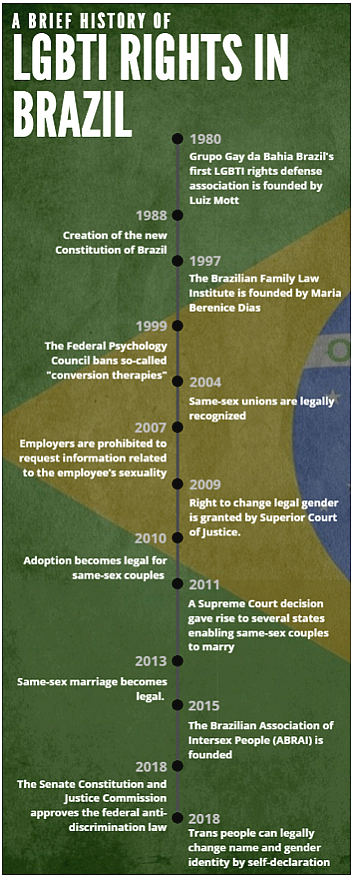Shifting the paradigm
Having the largest Catholic population in the world, Brazil is a country where culture, beliefs, and institutions are highly influenced by the Church. Catholicism left its mark on the legislation as well, contributing to the creation of a legal system that only recognized those who lived in the traditional family model — marriage between a man and a woman. Those who didn’t fit this category had no legal protection and there weren’t any laws guaranteeing their rights.
Recognizing the need for a fairer justice system, Dr. Berenice Dias founded the Brazilian Family Law Institute (Instituto Brasileiro de Direito de Família, IBDFAM) in 1997, and together with this organization, she started her revolutionary work. As a result of their joint efforts, the traditional form of marriage ceased to be the only possible basis of a family and instead, affection took its place.
 As Dr. Berenice Dias was not afraid to practice what she preaches, changes started to happen throughout the entire country. Whereas in most cases, judges had chosen not to recognize the rights of the “outcasts” before, the advances of Dr. Berenice Dias and the BFLI seemed to encourage some of them to make decisions in their favor. News of these cutting-edge decisions spread through publications, social networks, and the media, setting a different example to the judiciary and carrying an important message: you have rights no matter whom you love.
As Dr. Berenice Dias was not afraid to practice what she preaches, changes started to happen throughout the entire country. Whereas in most cases, judges had chosen not to recognize the rights of the “outcasts” before, the advances of Dr. Berenice Dias and the BFLI seemed to encourage some of them to make decisions in their favor. News of these cutting-edge decisions spread through publications, social networks, and the media, setting a different example to the judiciary and carrying an important message: you have rights no matter whom you love.
They also became precedents — such legal cases that establish principles that the court can use when deciding similar cases in the future. In one of her most notable books, Dr. Berenice Dias collected these cases and expressed a need for the recognition of same-sex unions as family entities. The first edition was published with the title “Homosexual union, prejudice and justice”, but with the progress that gradually took place in the country, the title changed as well.
The latest, 7th edition is called “Homoafetividade and the rights LGBT”. The word “homoafetividade” could be translated as “homoaffectionate”, it is a neologism created by Dr. Berenice Dias to reflect that same-sex relations are also based on affection, and therefore should be recognized as a basis of a family.
Dr. Berenice Dias continues her incredible work to this day. Besides founding the Commissions on Sexual Diversity and Gender that she also chaired for 10 years, she created a website that serves as a database of the rights guaranteed to the LGBTI population. Her latest book “Intersex – legal, international, labor, registration, medical, psychological, social and cultural aspects” is the first publication in the country to address the situation of Intersex people, and she is the founder of the first law firm specializing in “Homoafe Law.”
In a country led by a ‘proud homophobe’
“Important advances, but still permeated by enormous resistances.” This is how Maria Berenice Dias summarizes the current LGBT rights situation in Brazil.
There certainly are some shocking figures. Every 19 hours, someone is killed because of their sexual orientation or gender identity, making Brazil the country where the largest number of LGBT people are killed. And what’s even more shocking is that it’s not legally possible to punish homophobic practices. After all, nobody can be convicted of something that the law does not recognize as a crime. And to make the situation even worse, since last year’s elections Brazil has an openly homophobic president in the person of Jair Bolsonaro, who thinks LGBT people are causing the “moral degradation of society.”
However, the Brazilian LGBT community is not one to give up that easy. They are more and more organized and using the new digital media they can reach wider audiences with their positive message of acceptance. As Ms. Berenice Dias says, “gays, lesbians, bisexuals, transgenders, and intersexes of the country “came out of the closet”, painting Brazil the colors of the rainbow. They started something that cannot be stopped and will not be stopped, not just in Brazil, but throughout the whole world.”
Infographic Sources:
International Lesbian, Gay, Bisexual, Trans and Intersex Association: Carroll, A. and Mendos, L.R., State Sponsored Homophobia 2017: A world survey of sexual orientation laws: criminalisation, protection and recognition (Geneva; ILGA, May 2017) p. 49. Download: https://ilga.org/downloads/2017/ILGA_State_Sponsored_Homophobia_2017_WEB.pdf
Amnesty International (2018): Brazil 2017/2018. https://www.amnesty.org/en/countries/americas/brazil/report-brazil/
ASTRAEA Lesbian Foundation For Justice: Associacao Brasileira de Intersexos (ABRAI) https://www.astraeafoundation.org/stories/associacao-brasileira-de-intersexos-abrai/
Cowie, Sam; The Guardian (2018): Violent deaths of LGBT people in Brazil hit all-time high https://www.theguardian.com/world/2018/jan/22/brazil-lgbt-violence-deaths-all-time-high-new-research
CNN.com (2013): Brazilian judicial council orders notaries to recognize same-sex marriage https://edition.cnn.com/2013/05/15/world/americas/brazil-same-sex-marriage/index.html
The Guardian (2017): Brazilian judge approves ‘gay conversion therapy’, sparking national outrage. https://www.theguardian.com/world/2017/sep/19/brazilian-judge-approves-gay-conversion-therapy
Querino, Rangel (2018): Comissão aprova PL que torna a discriminação contra LGBT crime de injúria https://observatoriog.bol.uol.com.br/noticias/2018/03/comissao-aprova-pl-que-torna-a-discriminacao-contra-lgbt-crime-de-injuria
Reid, Graeme; Human Rights Watch (2018): Brazil Boosts Transgender Legal Recognition https://www.hrw.org/news/2018/03/14/brazil-boosts-transgender-legal-recognition

